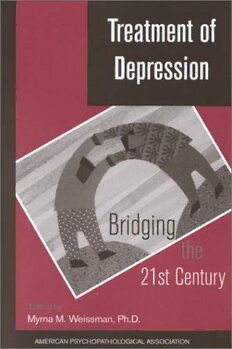
Treatment of Depression: Bridging the 21st Century (Paper from 89th Annual Meeting) PDF
379 Pages·2001·1.982 MB·English
Most books are stored in the elastic cloud where traffic is expensive. For this reason, we have a limit on daily download.
Preview Treatment of Depression: Bridging the 21st Century (Paper from 89th Annual Meeting)
Description:
The dramatic advancesAand controversiesAof the past 25 years in understanding the epidemiology and treatment (both pharmacotherapy and psychotherapy), and the health care and delivery issues surrounding major depression are presented in this collection. Divided into four parts, this fascinating volume comprises the contributions of internationally renowned experts from the United States, Switzerland, and the United Kingdom. -Part I, The Past and the Future, provides an historical and political review of the development and testing of antidepressants, including the controversial role of the pharmaceutical companies in legitimizing depression as a medical illness as a means of creating markets for their products. Also described is depression in the twenty-first century based on studies of the World Health Organization and the World Bank and the inherent conflict in treating depression under managed health care guidelines, i.e., depression, because it tends to recur over a personAs lifetime, mandates more medical care, whereas managed care, because it is structured for profit, mandates less medical care. -Part II, Basic Understanding, illuminates the role of genetics and basic and clinical biological sciences for developing new treatments as well as the contributions of the neurosciences toward developing new drugs and of psychobiology toward understanding relapse in maintenance treatment. -Part III, Treatment, describes the broad range of treatments now available in the United States and the United Kingdom for both adults and children (25 years ago, depression was not believed to exist in children); advances in the physical treatment of depression; problems inherent in testing new drugs (the serendipity factor) and the institutional changes necessary to accelerate the process of discovering effective psychotropic drugs; and clinical practice guidelines and how they affect managed care. -Part IV, Psychotherapy and Evolving Health Care, focuses on the changes required to ensure that psychotherapy remains a reimbursable treatment within managed care, covering the training and use of effective, time-limited treatments. The epilogue highlights the paradox of over- and underuse of psychotherapy for depression, noting that very few of the more than 200 identified therapies have ever been tested and calling for new testing of psychotherapy in comparison or combination with pharmacotherapy. At once wide-ranging and concise, this volume offers updates on the both medications and the psychotherapies used to treat depression worldwide. As such, it will appeal to a broad audience of psychiatrists, psychologists, social workers, and primary care practitioners.
See more
The list of books you might like
Most books are stored in the elastic cloud where traffic is expensive. For this reason, we have a limit on daily download.
